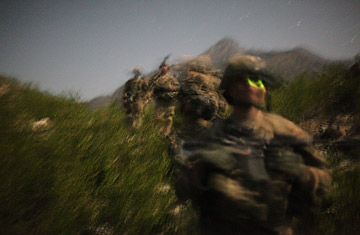
US Soldiers walk down the mountain toward landing zone be flown out by Blackhawks back to Combat Outpost Monti, in Kunar Province, Afghanistan, November 5, 2011.
It was mid-October 2011 and first platoon had already been fighting for its life for a few days. The 10 Afghans and 26 Americans had withstood repeated assaults by an estimated 300 to 500 insurgents who had crossed the border from bases in Pakistan. Fighters got within five meters of the platoon's battle positions — with some coming through the perimeter wire. They almost overran the position four times — something that has happened before in Kunar province, with deadly consequences. Now the insurgents had the position dialed in on their 82mm mortars.
"Sgt. Sanes got hit with two rounds simultaneously on his position within five meters," platoon Staff Sgt. Anthony Fuentes told TIME a few days after the fight. The rounds landed just as an Afghan Army sergeant was firing a recoilless rifle. The blast knocked him to the ground and his round exploded inside their position. After that, "our weapons squad leader [Sanes] was giving fire commands to a rock. That's what happened in our case. They got nauseous, they couldn't vomit (but they wanted to), they couldn't focus and they had double vision," says Fuentes.
His eyes still somewhat glassy after coming off the mountaintop position of Outpost Shal just four days before, Staff Sgt. Michael Sanes said, "I was a little out of it and I was screaming for my [machine] gunner to get back on the gun and shoot. I was like... 'shoot and shoot,' and he was already shooting. I was a little out of it from the blast. I got my bell rung." It was Sanes' third combat tour. The heavy fighting to take the mountaintop position lasted some eight days and the platoon had to call in multiple danger close artillery missions and airstrikes in which heavy ordnance was dropped within 300 meters of their positions.
The pounding that Sanes and his men took may have been intense but multiply it by hundreds and thousands of incidents over a range of severity and you have the potential causes for what may be a murkily diagnosed set of symptoms affecting U.S. servicemen and veterans. Rep. Bill Pascrell (D-N.J.), co-chairman of the Congressional Brain Injury Task Force, has called Traumatic Brain Injury (TBI) "the signature injury of the wars in Iraq and Afghanistan." Though no clear statistics exist for TBI, it is estimated that there are between 115,000 and 400,000 veterans who now suffer from at least mild versions of it.
TBI may have a role in the case of staff sergeant Robert Bales who allegedly killed 16 civilians. According to his Seattle lawyer, Bales supposedly suffered a concussive brain injury. He reportedly lost part of a foot in another battle-sustained injury. The sergeant was averse to returning to duty, said the lawyer, who described his client as "decorated." Bales, the lawyer said, had just seen his best friend lose a leg the day before. Sources talking to the New York Times described the suspect as having marriage, alcohol and stress related problems and "just snapped." The lawyer, however, denied that alcohol and marital issues were involved in the incident.
On Tuesday, Rep. Pascrell sent a letter on Tuesday to Secretary of Defense Leon Panetta seeking information on the staff sergeant's injury, diagnosis and treatment. "Over the years I have become increasingly concerned about that the [Defense] Department's system for identifying service members with traumatic brain injuries has not been working," Pascrell wrote. "It is critical that we know whether the systems the Department has in place to identify these injuries and provide treatment are adequate and that the needs of our injured soldiers are being properly met," The Star-Ledger reported.
Though the military has made some improvements over the past decade in diagnosing and treating TBI and post-traumatic stress disorder (PTSD), much more needs to be done, particularly because President Barack Obama has made it clear that the U.S. will stay in Afghanistan until scheduled 2014 deadline, ensuring that thousands more soldiers will suffer physical and emotional trauma.
